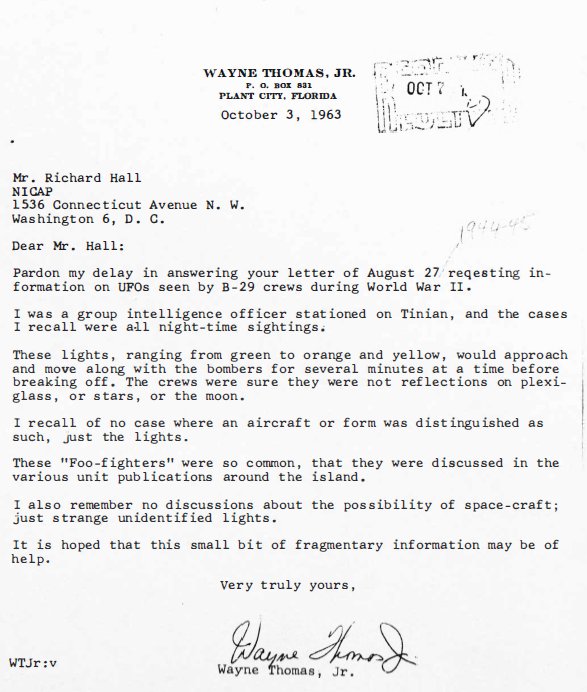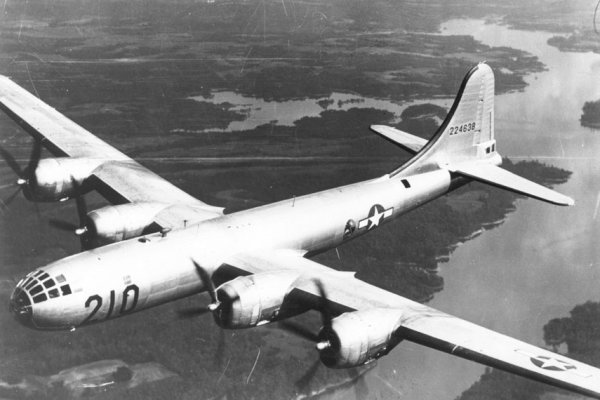ACUFO-1945-06-00-JAPAN-1
On October 3, 1963, Wayne Thomas Jr., of Plant City, Florida, USA, wrote to Richard Hall of the NICAP ufology group in the USA. He was responding to a request from Richard Hall for information on UFOs seen by B-29 crews during World War II.
Wayne Thomas explained that he was at the time an intelligence officer for a group stationed on Tinian, and that the cases he remembers were all nocturnal sightings.
The cases involved lights, ranging from green to orange and yellow, approaching and moving with the bombers for several minutes before going out. The crews were sure that these were not reflections on blisters, nor stars, nor the moon.
He did not recall any instance where an aircraft or shape had been distinguished as such, only lights were seen.
He indicated that these “Foo-fighters” were so common that they were mentioned in the various publications of units around the island; there was no discussion of the possibility that they were spaceships, and that they were only seen as strange unidentified lights.
| Date: | June or July, 1945 |
|---|---|
| Time: | Night. |
| Duration: | Several minutes. |
| First known report date: | 1963 |
| Reporting delay: | 2 decades. |
| Country: | Japan |
|---|---|
| State/Department: | |
| City or place: |
| Number of alleged witnesses: | Several. |
|---|---|
| Number of known witnesses: | ? |
| Number of named witnesses: | 0 |
| Reporting channel: | Letter to ufologist Richard Hall. |
|---|---|
| Visibility conditions: | Night. |
| UFO observed: | Yes. |
| UFO arrival observed: | ? |
| UFO departure observed: | Yes. |
| UFO action: | |
| Witnesses action: | |
| Photographs: | No. |
| Sketch(s) by witness(es): | No. |
| Sketch(es) approved by witness(es): | No. |
| Witness(es) feelings: | ? |
| Witnesses interpretation: | Not reflections, not astronomical. |
| Sensors: |
[X] Visual: Several.
[ ] Airborne radar: [ ] Directional ground radar: [ ] Height finder ground radar: [ ] Photo: [ ] Film/video: [ ] EM Effects: [ ] Failures: [ ] Damages: |
|---|---|
| Hynek: | ? |
| Armed / unarmed: | Armed, 12 Browning M2 12.7 mm machine guns. |
| Reliability 1-3: | 2 |
| Strangeness 1-3: | 2 |
| ACUFO: | Insufficient information. |
[Ref. nip2:] WAYNE THOMAS - NICAP ARCHIVE:

|
WAYNE THOMAS, JR.
P. O. BOX 831
PLANT CITY, FLORIDA
October 3, 1963
Mr. Richard Hall
NICAP
1536 Connecticut Avenue N. W.
Washington 6, D. C.
Dear Mr. Hall:
Pardon my delay in answering your letter of August 27'reqesting information on UFOs seen by B-29 crews during World War II.
I was a group intelligence officer stationed on Tinian, and the cases I recall were ail night-time sightings.
These lights, ranging from green to orange and yellow, would approach and move along with the bombers for several minutes at a time before breaking off. The crews were sure they were not reflections on plexiglass, or stars, or the moon.
I recall of no case where an aircraft or form was distinguished as such, just the lights.
These “Foo-fighters” were so common, that they were discussed in the various unit publications around the island.
I also remember no discussions about the possibility of space-craft; just strange unidentified lights.
It is hoped that this small bit of fragmentary information may be of help.
Very truly yours,
[Signed]
Wayne Thomas, Jr.
[Ref. prt1:] JAN ALDRICH - "PROJECT 1947":
Jan Aldrich published a transcript of the [nip2] letter, and commented:
PROJECT 1947 Comment: Dr. Robert L. Hall, Head of the Department of Sociology and Social Psychology at the University of Chicago and brother of the late Richard Hall, Assistant Director of NICAP, also served in the Pacific. He, too, heard about many sightings of unusual objects by aircrews including “high altitude, high speed balloons.” While some official documents reporting these objects have been recovered from official files, only the surface has been scratched. For example: we know that the Air Intelligence Weekly Digest for the XX Bomber Command did have information about foo-fighters, but we have only been able to locate Vol. 2 #12 which does not discuss the subject. Additional unit histories refer to as many as 40 sightings on just one mission over Japan. This is an area for further investigation.
[Ref. rhl1:] RICHARD H. HALL:
Wayne Thomas, Jr., a former group intelligence officer for B-29's stationed on Tinian also has confirmed that “Foo-fighter” reports were common in the Asian Theater. They would typically move along with the bombers for several minutes at a time before breaking off.
[Ref. vgs1:] VINCENT GADDIS:
Mr. Wayne Thomas, Jr. of Plant City, Florida, was a group intelligence officer on Tinian in the Mariannas Islands late in the war. He states thatthe foo fighters were so common that they were discussed in the various unit publications around the island. They would approach and move with the bombers for several minutes before breaking off.
"I recall in no case where an aircraft or form was distinguished as such," he wites, "just the lights."
The source is noted as "The UFO Evidence, page 26, by the National Investigation Committee on Aerial Phenomena, Washington, D.C., 1964.
[Ref. lgs1:] LOREN GROSS:
Throughout the Marianas island chain [in 1945], every B-29 outfit eventually claimed its share of fireball sightings. As time wore on, the fireballs paœd the bombers farther and farther out to sea and became more active in their maneuvering.
Wayne Thomas did not provide information on the planes involved, but they were obviously B-29s.
The Boeing B-29 “Superfortress” was the heaviest bomber of the U.S. Army Air Forces, used in operations from May 8, 1944 and on. Its maximum speed was 574 km/h.
Its defensive armament was 12 Browning M2 12.7 mm machine guns.

|

|
In March 1944, the 9th bombardment Group (Very Heavy) prepared for combat with B-29's, they moved to the Pacific theater from November 1944 to February 1945, and assigned to Twentieth AF. They started operations late in January 1945 with attacks against Japanese-held Maug. After that, they struck industrial targets in Japan, conducting the missions in daylight and at high altitude. Received a DUC for bombing the industrial area of Kawasaki in April 1945. Beginning in March 1945, the group carried out incendiary raids at night on area targets in Japan. During April and May 1945, it assisted the Allied assault on Okinawa by hitting airfields that the Japanese were using to launch planes against the invasion force, and also conducted mining operations against Japanese shipping, receiving a second DUC for such actions in the Inland Sea during May 1945.
Wayne Thomas was a member of the 760th Squadron of the 460th Bombardment Group (Very Heavy) of the US Army Air Forces.
It is difficult here to speak of a “case” per se, we rather have a general testimony on the “balls of fire” events in the Pacific.
Insufficient information.
* = Source is available to me.
? = Source I am told about but could not get so far. Help needed.
| Main author: | Patrick Gross |
|---|---|
| Contributors: | None |
| Reviewers: | None |
| Editor: | Patrick Gross |
| Version: | Create/changed by: | Date: | Description: |
|---|---|---|---|
| 0.1 | Patrick Gross | January 30, 2024 | Creation, [nip2], [lgs1], [prt1]. |
| 1.0 | Patrick Gross | January 30, 2024 | First published. |
| 1.1 | Patrick Gross | June 6, 2024 | Additions [rhl1], [vgs1]. |